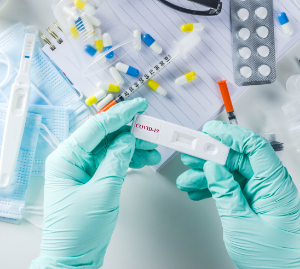Ever been tested for the flu? If you have, you may have noticed there are two different types of tests: the quick one that comes back with an answer within minutes, and the longer one that takes 45-60 minutes. These same techniques are used for coronavirus testing, with PCR testing being the long one, and antigen testing the quick one. Then there’s antibody testing, which is used to help determine if a person has previously been infected, and in certain cases, can identify patients with current infection (see details below).
In this article, we’re going to break down the science behind how each of these tests work—for somebody with a non-medical background, of course. Want the high-level overview on these three tests, their reliability, and how to access them? Check out our post on “Coronavirus testing: what you need to know”. If you’re looking for a more in-depth explanation, however, keep reading below.
PCR or Diagnostic testing
The PCR test takes a sample of mucus from your nose or mouth and then puts the sample through what’s called a “polymerase chain reaction” (PCR). This is a laboratory process that helps identify if any of the virus’ genetic material (think DNA) is present in the mucus. This process takes a bit longer than the antigen test (the “rapid flu” or “rapid strep” test of coronavirus) because it requires a lab technician to literally run the sample through the PCR process. In order for the test to be positive, the virus must have enough time to multiply and actually get into the mucus in your nose and throat. Said another way, the test may be negative for the first few days after you are infected.
Antigen testing
Antigen tests identify the presence of certain proteins from the virus in upper respiratory secretions from your nose or mouth (e.g. saliva, mucus, and of course, “boogers”). It uses the same technique as the rapid strep test, which you may have previously done for yourself or your children.
Unlike the rapid strep test, which has been around for awhile and is relatively accurate, the coronavirus antigen test is fairly new (the Food and Drug Administration only approved the first test of its kind in early May of this year) and the jury is still out on how accurate it will be. For example, the rapid flu test, which also uses this type of lab technology, isn’t as accurate as the rapid strep test. In summary, we still need to learn more about the effectiveness of this type of coronavirus testing before we can truly rely on it.
Antibody testing

Finally, we get to antibody testing, the one that seems to be always in the news. But what is it exactly and can we trust it? Antibody testing has been around for a long time, so this method of testing is well known and tried and true. Unlike PCR and antigen testing, which looks for evidence of the virus, antibody testing is completely different and measures specific parts of your immune system. Unfortunately, this type of testing is only done with a blood specimen (ouch).
See, whenever you get infected with a virus, your immune system says to itself, “how can I kill this virus now? How can I ensure that I’m ready to prevent it from coming back in the future?” To answer these questions, your immune system starts creating what’s called “antibodies”.
The really cool thing is that (through a pretty complicated process that isn’t worth explaining here) your immune system makes a few different types of antibodies: an antibody for actively fighting off the infection (let’s call that Antibody A), and an antibody for after you fought off the infection to help prevent future infections (let’s call that Antibody B). Why is that cool? Well, because it makes it easy to test both types of antibodies and come up with one of the following conclusions:
- You have never been infected with coronavirus (you don’t have either type of antibody against coronavirus, neither A nor B)
- You currently have coronavirus (you only have Antibody A but not Antibody B)
- You had coronavirus in the past, but not now (you only have Antibody B, as Antibody A slowly went away as the infection passed)
With all that said, it is a bit unclear how effective antibody testing for coronavirus actually is at the moment. We simply don’t know if this virus will act like other viruses when it comes to the way antibody testing is looked at (as above). Early reports show that it takes several days to weeks for your body to produce the initial antibodies to coronavirus (the Antibody A type ones that come when you are actively fighting the infection). One study showed it took 12 days from the first sign of symptoms. This means antibody testing may not be great at telling us if someone has an active coronavirus infection.
But isn’t antibody testing great at telling us if someone has had COVID-19 before and is now immune to it (i.e. they have the Antibody B type)? Well, honestly, the jury is still out on this question too. Yes, antibody testing should be pretty reliable at telling us that someone has had the infection before, but, unfortunately, there isn’t enough evidence yet to prove that having had the infection before actually protects you from future infections by a similar, yet different form of COVID-19.
This can be complicated to think about, especially if you are worried about being sick, so feel free to leave the thinking to us! Chat with a nurse if you are unclear about what to do next. We can help!
– Igor Shumskiy, MD